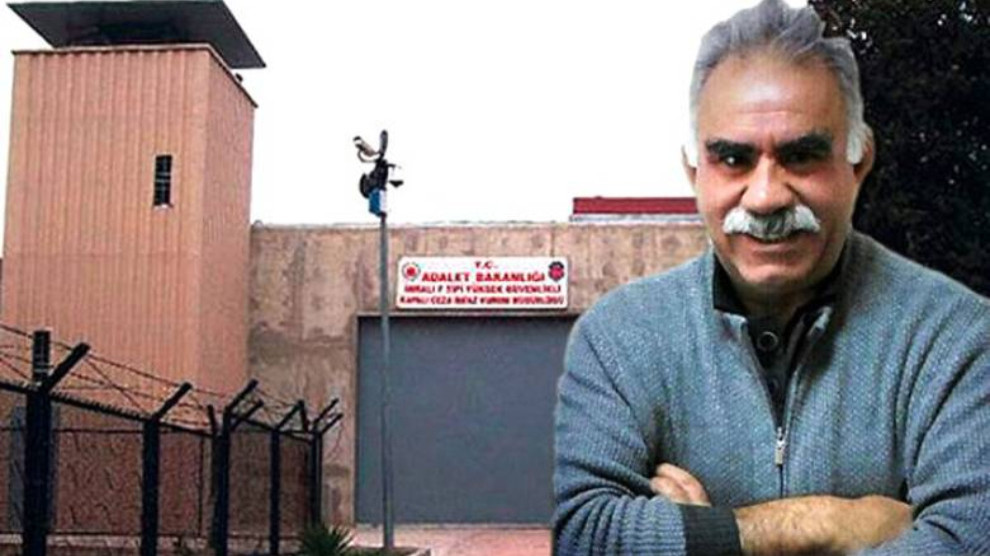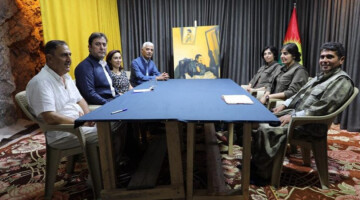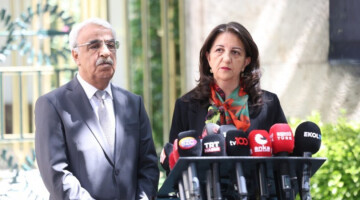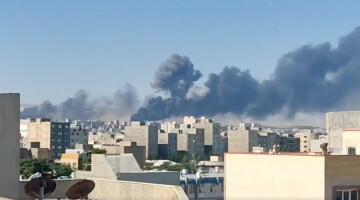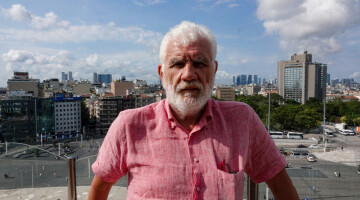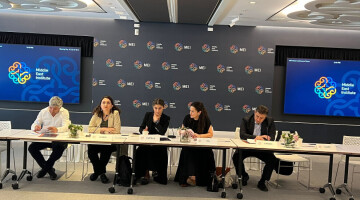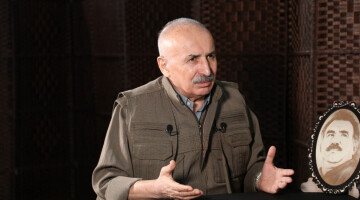After 21 years, the Kurdish People’s Leader Abdullah Öcalan was able to talk to a relative on the phone for the first time. His fellow prisoners Ömer Hayri Konar, Hamili Yıldırım and Veysi Aktaş, who similarly have been isolated on Imrali, were also able to speak to family members by telephone. Abdullah Öcalan's conversation with his brother lasted about 25 minutes.
Mehmet Öcalan talked to the Mezopotamya news agency (MA) about the conversation with the PKK leader: "We were sent to the General Prosecutor's Office in Urfa to make the phone call. I alone was allowed to enter the room where the phone conversation was to take place. We had about 20 to 25 minutes to talk on the landline of the public prosecutor's office around 1 pm. I was happy when I heard the chairman's voice on the phone."
Öcalan's brother pointed out that it was a basic right to phone and visit prisoners, but that he had been turned away countless times and that the ferry had repeatedly returned halfway on its way to Imrali. "We have been denied our constitutional and democratic rights for 21 years. The ears and eyes of the Kurdish people are focused on Imrali," he stressed.
"At the moment I feel fine but I don't know if it will continue”
Abdullah Öcalan explained to his brother that time was too short to evaluate current events, so he would limit himself to the most necessary points. Mehmet Öcalan summarized their talk as follows: "I told him that the people are worried about the pandemic and the situation on Imrali. The chairman said that his health is good at the moment but he doesn't know if it will continue." Öcalan did not talk further about the pandemic, but rather about the developments in Kurdistan.
"Kurds are played off against Kurds"
Mehmet Öcalan continued: "He said about the developments in the South [Southern Kurdistan] that Kurds are being played off against Kurds and that nothing can be gained for the Kurds from such a conflict. But this policy will not be to Turkey's advantage either. Neither the KDP nor the PUK or any other Kurdish movement should be under the misapprehension that they will be granted their own state in return for their support to this conflict. This is neither acceptable nor realistic. He called for all to act on the basis of Kurdish unity.
"The Kurds don't need war, they need unity"
Abdullah Öcalan pointed out that the Kurds have been in need of unity for 40 years, Mehmet Öcalan explained and continued: "He said that the people who live there are Kurds and everyone will suffer defeat in case of bloodshed. This applies to Qandil as well as to the Kurdish regional government. He stressed that his message is addressed to the Barzani family, the Talabani family and the people of Southern Kurdistan. The Kurds do not need war and bloodshed but peace and unity. He said this is his most important message.”
The 1982 protocol could be updated
Mehmet Öcalan continued: “In 1982, a ten-point agreement was concluded with Idris Barzani, the father of Nechirvan Barzani. The PUK also knew about it. This agreement could be renewed today. He sent greetings to Nechirvan Barzani, Masrour Barzani and the children of Jalal Talabani and said: 'They must know that if the Kurds are not united, nobody will do anything for them, they should not trust anyone. Bloodshed among Kurds is unacceptable, neither the people nor we accept it. If there is a problem, it must be solved through dialogue and peace must be guaranteed'.' He emphasised that everyone must perceive the urgent need for Kurdish unity. The road to unity passes through all four parts of Kurdistan. The chairman pointed out that: 'The Kurds have to come to an understanding at a certain point and if there is a problem, it has to be solved through dialogue. This is up to the Barzani and Talabani families, as well as the friends in Qandil. Both the Kurdish people and we expect that no blood will be shed among Kurds."
"Organisation in all four parts must be strengthened"
Abdullah Öcalan also talked to his brother about the situation in Rojava: "He said: 'From what I have heard, the situation in Rojava is neither good nor bad. The chairman explained that the democratic institutions and parties in Rojava have not been able to expand their democratic structure and are still very limited. He pointed out that no solution could be found in this way if a force was not established as a whole. he said there should be more organisation, in all four parts of Kurdistan, and that organisation and transformation into a force would help the development of a solution. The Chairman continued: 'A mindset of ‘small but mine’ is unacceptable. Everyone must represent themselves. Our party will never accept this, there must be no organisation basing on ethnic or religious lines. It would be good if you could guarantee and strengthen democratic unity through the party.”
"Nobody should use me for their own interests"
Mehmet Öcalan quoted the Kurdish leader as saying; “There are many false evaluations of me. I know what kind of fight I'm fighting here. If there is a chance in the near future, I will give the necessary response. No one should use me for their own interests. The whole world knows what I've been doing for 50 years. The friends with me and I do all the good things that are possible for our comrades from our cells. It is not acceptable if it is not handled properly. Everything is quite open. There is nothing to hide. There is a big problem and everybody has to work in the right way. There is bloodshed, if you grow strong, you can stop it. Everyone has to fight for it, that has to be the focus.
"HDP must expand its organisation"
The HDP must strengthen itself. It must carry out important work and move along a broad perspective. It must expand its organisation and become a force. If it doesn't do that, it will be destroyed by the other side.'"
"Greetings to the prisoners"
Mehmet Öcalan concluded with: "The Chairman repeated the message he had given us during our last visit to Imrali on 3 March. He stated that the content of the message should be implemented. Finally, the chairman greeted friends in the prisons, the families of the martyrs and the people. He concluded with the words: "I greet all who ask me and listen to me."

